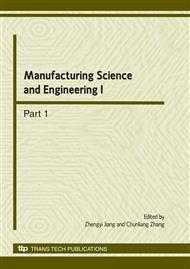p.2995
p.3001
p.3005
p.3010
p.3014
p.3020
p.3024
p.3028
p.3033
Simulation and Experimental Investigation for the End Milling Process of 7075-T7451 Aluminum Alloy
Abstract:
During the milling operation, milling forces are the main factor to cause the machining deformation of the workpiece. The flow stress of Al 7075-T7451 was first described as a function of strain, stain rate and temperature in order to obtain the true behavior in machining process. Second, a finite element method of milling process of Al 7075-T7451 was developed to obtain milling force simulations. Finally, simulated results are compared with experimental data and are shown to be in good agreement with each other.
Info:
Periodical:
Pages:
3014-3019
Citation:
Online since:
March 2010
Authors:
Price:
Сopyright:
© 2010 Trans Tech Publications Ltd. All Rights Reserved
Share:
Citation:


